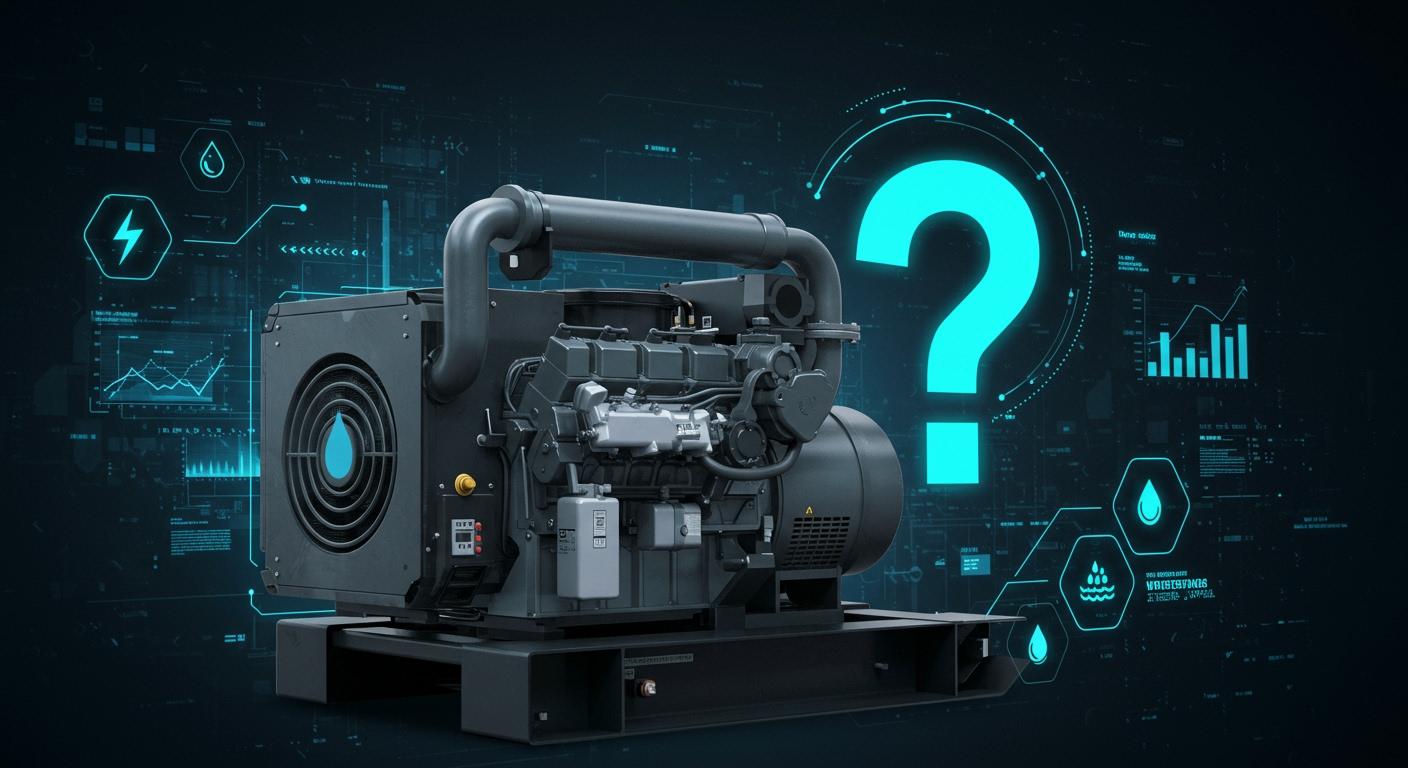
A water cooled diesel generator remains cool and provides constant power. It’s a good option for heavy, frequent use. It’s actually a more durable and longer lasting diesel generator than many others. You should consider how much care it requires and what the cost will be. And also if it serves your needs. Noise, remote control and safe fuel are three factors that many people care about as well. All of these are things matter when selecting a diesel generator. This is an excellent choice if you want a powerful and durable generator.
Water Cooled Diesel Generator Benefits
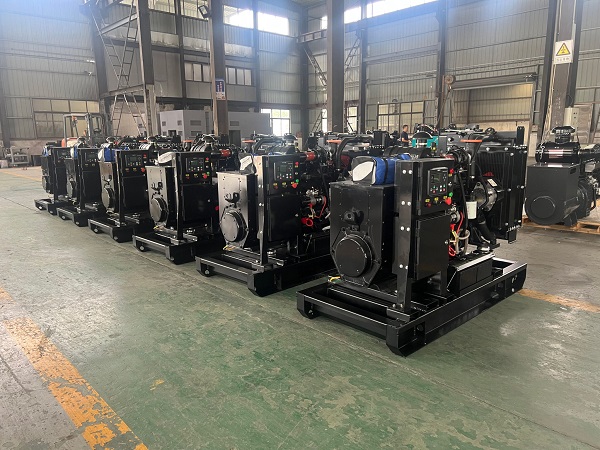
Cooling Efficiency
When your generator is laboring, you want it to remain cool. Water-cooled generators employ a system that circulates liquid around the engine. This system gets heat out fast and keeps the engine happy. Liquid coolant is capable of absorbing more heat than air. It makes the generator perform better.
- Cooling Another consideration when comparing diesel generators is whether you require air-cooled and water-cooled types. They are better coolers than air-cooled models.
- Water cooled units offered and provide fast cooling with constancy. This will make your generator work right.
- These generators also have a better conversion of power efficiency. For the same fuel you get more power.
- Water cooling is the choice of most experts for high-power diesel generator sets. This is simply because it’s super efficient.
Together with water cooled diesel generator for you long hour or heavy jobs. You can count on it to perform in the heat or handling hard work.
Reliability
You need a generator that you can rely on. For water cooled machines, such as a generator, typically utilize a water pump and a radiator with fan assembly. Together, these parts help keep the engine cool. When a motor runs cool, it doesn’t suffer as much wear.
- The liquid-cooled generators’ cooling system aids in the slowing down of engine wear.
- Air-cooled generators can become extremely hot, particularly in warm climates or after extended use. This can cause these components to wear out more quickly.
- Water-cooled generators use liquid coolant. They can work when it is hot, or when the work is difficult.
For jobs that require consistent power or extensive run times,, liquid-cooled generators are favored by many experts and generator manufacturers. You are guaranteed reliable performance and don’t need to be concerned about overheating.
Longevity
You want your generator to last a long time. Water-cooled generators can run for many years if you take care of them. The cooling system stops the engine from getting too hot. This helps all the parts last longer.
Here is a simple table that shows how long different types of generators can last:
| Generator Type | Typical Lifespan (Hours) |
|---|---|
| Air-Cooled Engines | 1,000 |
| Liquid-Cooled Engines | 60,000 – 90,000 |
Liquid-cooled generators can run more hours and last much longer than air-cooled. You get increasing value because you don’t have to replace your generator so often. Some power experts say liquid-cooled generators are the most powerful machines for sustained use — and a long-term investment.
Tip: If you require a generator of longer working hours or big jobs, consider to choose a water cooled diesel generator. You’ll get increased efficiency, huge reliability and longer life.
Diesel Generator Drawbacks
Cost
A water-cooled diesel generator tends to be more expensive to purchase. The first price is also more than an air-cooled model. This is because it requires additional components such as radiator and water pump. They’re the parts that raise the price. And you also have to consider the price in the future. The water-cooled diesel generator is somewhat more complicated. Repairs and new parts may cost you more later, maybe. These generators are effective, but it’s wise to anticipate high cost when buying and maintaining them, experts say.
Note: If you are trying to save money and you only need a generator for small tasks, it might be worth considering another type.
Maintenance
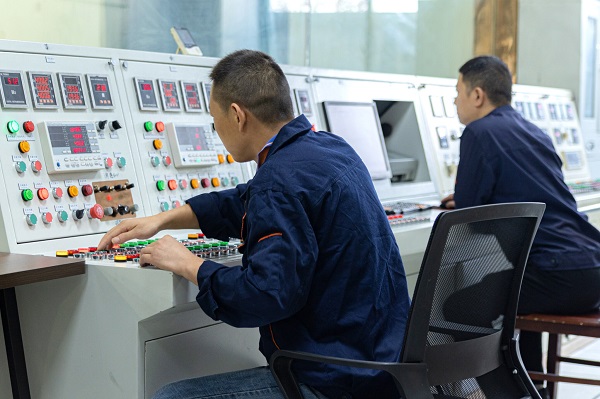
Water cooled diesel generator: Requires frequent maintenance of a water-cooled diesel generator. You’ll have to test and replace coolant. You are expected to maintain the cleanliness of the engine oil. The fuel must stay clean too. The air filter and battery also need to be taken care of. Performing these tasks will promote good operational, duration use and longevity of generator. However, these jobs are also more expensive.
Here is a table that shows common maintenance jobs and how they change your costs:
| Maintenance Task | Impact on Total Cost of Ownership |
|---|---|
| Regular Coolant Checks and Changes | Stops scale from building up, helps cooling work better. |
| Engine Oil Maintenance | Stops engine parts from wearing out fast. |
| Fuel System Care | Stops dirt from getting in, keeps generator working. |
| Air Filtration System Maintenance | Helps engine work well, stops extra wear. |
| Battery Maintenance | Helps generator start, saves money on new batteries. |
| Scheduled Professional Inspections | Finds problems early, stops big repairs. |
You should also plan for yearly care. For a small generator up to 20 KW, you might spend about $750 each year. For a bigger generator up to 150 KW, you could pay up to $1,100 a year. These numbers come from studies and show what many owners really pay.
Installation
It takes more work to set up a water-cooled diesel generator. You need space for the radiator and coolant lines. You may also need a special spot to keep the generator safe and cool. This can make the setup cost more and take longer. You might need a professional to help install it the right way. Experts say you should follow all safety rules and local laws. This helps stop problems and keeps your generator working well. If you do not have much space or want an easy setup, an air-cooled diesel generator might be better.
Tip: Always talk to a licensed installer before you buy a water-cooled diesel generator. This can help you avoid extra costs and make sure your power system works right.
Generator Cooling Systems Comparison
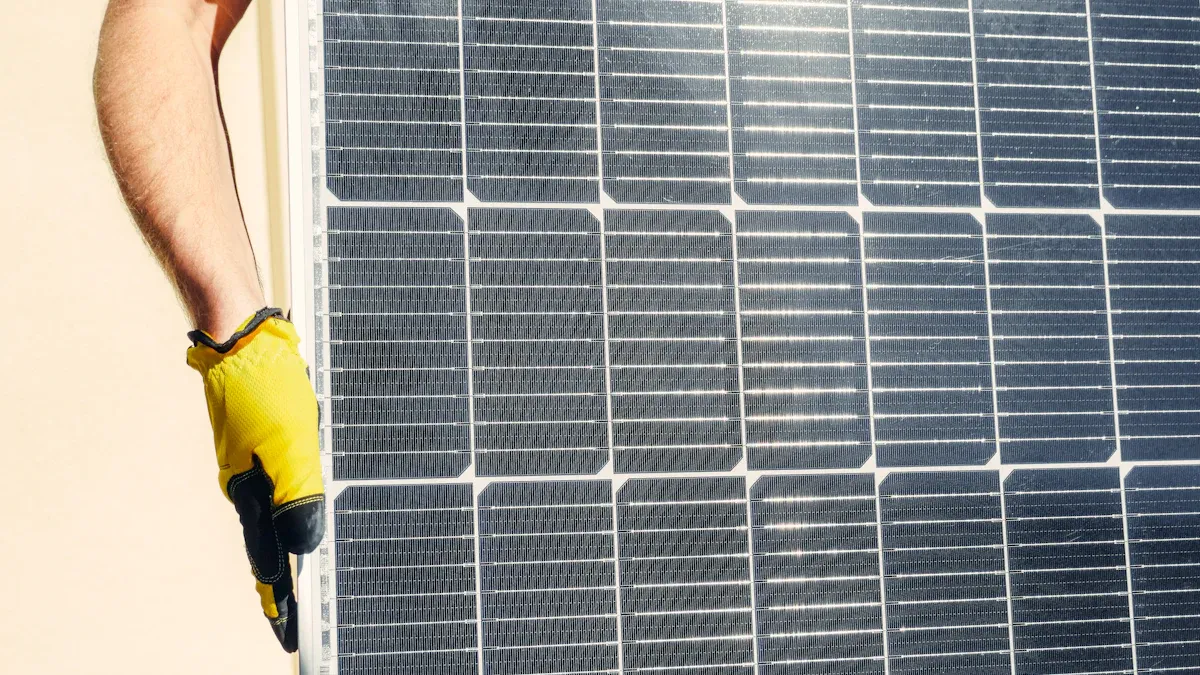
Water vs Air Cooling
There are two main ways to cool a generator. These are water-cooled and air-cooled systems. Each type keeps the generator from getting too hot. Water-cooled systems use a closed radiator and coolant. This moves heat away from the engine. Air-cooled systems use fans. The fans blow air over the engine to cool it down.
Here is a simple table to help you compare these generator cooling systems:
| Feature | Air-Cooled Generators | Water-Cooled Generators |
|---|---|---|
| Cooling Mechanism | Uses air to cool the engine | Uses a closed radiator system |
| Size | Smaller and lighter | Bulkier and heavier |
| Installation | Easier to install | Needs a prepared bed |
| Cost | Less expensive | More expensive |
| Maintenance | Simpler, less time needed | More frequent, more complex |
| Noise Levels | Louder | Quieter |
Air-cooled generator cooling systems are smaller and lighter. They are easy to set up and cost less money. They also need less care. Water-cooled generator cooling systems are bigger and heavier. They take more work to install. They run more quietly and last longer if you take care of them. Many experts say water-cooled systems are best for hard jobs.
Tip: If you want a generator for your house or for easy jobs, air-cooled systems may be better. For long or hard jobs, water-cooled generator cooling systems work better.
Performance Differences
How a generator cooling system works changes how well your generator runs. In hot weather or after long use, air-cooled systems can have trouble. They might not keep the engine cool enough. This can make the generator work less well or even overheat. Water-cooled generator cooling systems handle heat better. They keep the engine at the right temperature, even when you use a lot of power.
Here is a table that shows how each type of generator cooling system works in high temperatures:
| Type of Generator | Performance Under High Ambient Temperature |
|---|---|
| Air-Cooled Generators | May struggle to keep cool, risk of overheating and less power |
| Water-Cooled Generators | Keeps steady temperature, better efficiency and longer life |
Water-cooled generator cooling systems help your diesel generator work well, even in tough places. You get steady power and can use it for a long time. Many experts say water-cooled systems are best for hot places or big jobs.
Note: If you need strong power and want your generator to last, pick a generator with a water-cooled system.
Cost-Benefit Of Liquid-Cooled Generators
Upfront vs Long-Term
Liquid-cooled generators cost more when you buy them. You also pay more to set them up. Air-cooled models cost about $8,000 to $10,000 to install. Liquid-cooled models can cost $17,000 to $20,000. That is a big price jump. But liquid-cooled generators last much longer. Air-cooled units work for about 1,500 to 3,000 hours. Liquid-cooled generators can run for 7,000 to 10,000 hours. You might save money over time. You will not need to buy a new generator as often.
Here is a table that lists the main costs you should think about over 10 years:
| Cost Type | Description |
|---|---|
| Initial Purchase Price | One-time cost of the generator |
| Installation Cost | One-time cost for setting up the generator |
| Annual Fuel Expenses | Recurring cost based on usage over 10 years |
| Annual Maintenance Costs | Recurring cost for upkeep over 10 years |
| Extended Warranty Cost | Optional recurring cost for warranty over 10 years |
Tip: If you use your generator a lot or for long times, paying more at first may save you money later.
Fuel Efficiency
Fuel efficiency is very important for diesel generators that do hard work. A fuel-efficient generator uses less diesel to make power. This means you spend less on fuel. Water-cooled models usually use less fuel than air-cooled ones, especially when working hard.
Here is a table that shows how much fuel each type uses at different power levels:
| Load (kW) | Water-Cooled (gal/hr) | Air-Cooled (gal/hr) |
|---|---|---|
| 100 | 4.10 | 5.80 |
| 200 | 7.70 | 11.00 |
| 400 | 14.90 | 21.30 |
| 600 | 22.00 | 31.50 |
| 750 | 27.40 | 39.30 |
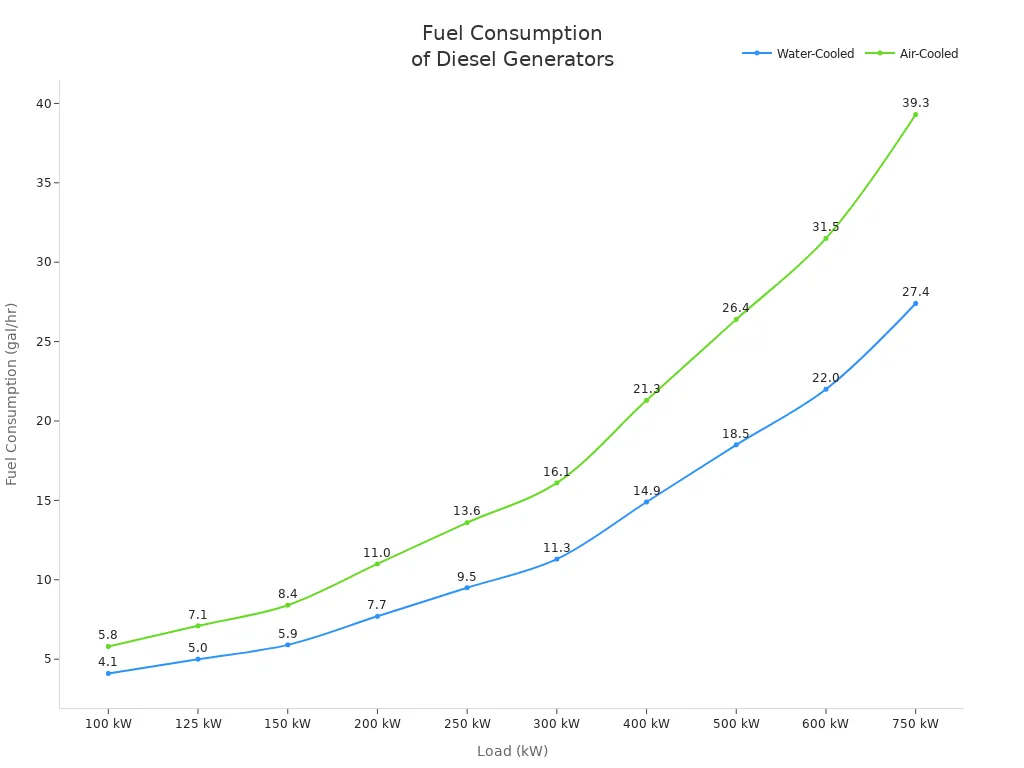
You can see water-cooled generators use less fuel at every power level. This helps lower your running costs. Experts say good care and using the right load help your generator work its best.
- Fuel efficiency shows how well your generator turns diesel into power.
- Using less fuel saves you money over time.
- Good engine design and regular care help your generator use less fuel.
Resale Value
This is important if you decide to sell your generator later. Liquid-cooled will generally fetch more than air-cooled. They last longer and give you fewer problems if you look after them. People shopping for generators are looking for those that have a lot of hours left. A well-taken-care-of liquid-cooled generator can be sold for a higher price. Equipment that lasts a long time and has a good service record is easier to sell, experts say.
Note: If you want to spend with the future in mind and keep your investment safe, choose a generator that holds its value.
Choosing The Right Generator
Best Use Cases
But the key is you need to choose the right generator for your needs. Water-cooled diesel generators are ideal for applications with continuous use. They don’t run overly hot and are capable of handling substantial jobs. You will often find them in:
- Large engines and big buildings
- Offices, restaurants, and stores
- Small factories and farms
- Warehouses and places that use lots of power
When you require more than 18kW up to 24KW of power, water cooled diesel generators are the model to choose. They provide up to 150kW of power. They use a liquid coolant to prevent the engine from overheating. Liquid-cooled generators are best for extended power outages, according to experts. They continue to work even when the air-cooled may have already stopped.
These are the things you’ll want to consider when selecting a water-cooled generator:
- How much power it gives
- How much fuel it uses
- How loud it is
- How big it is
- The brand and warranty
- How much you want to spend
The right generator will supply you with fractional power for many years.
Alternatives
You might not need a big generator for every job. Air-cooled diesel generators be more effective for short or light use. These are less expensive and easier to get in. They are great for houses or small shops that don’t require much power.
| Generator Type | Cost Range |
|---|---|
| Small Portable Units | $9,000 – $14,000 |
| Mid-Sized Models (15-20 kW) | $12,000 – $16,000 |
| Larger Commercial Units (30 kW) | $17,000 – $19,000 |
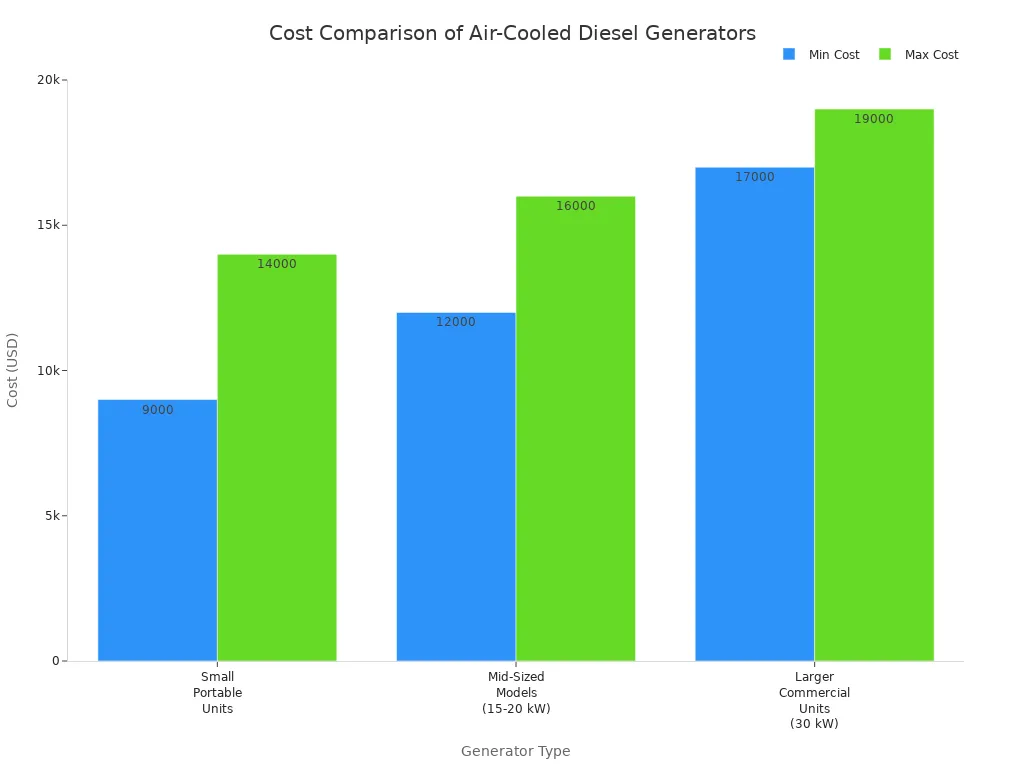
You can also try other backup or green energy choices. Solar generators are better for the earth and more people use them now. By 2023, four million homes in the US will have solar panels. Natural gas, renewable diesel, and biodiesel are good if you want less pollution. Some people use fuel cells or linear generators for clean power, but these can cost more.
Tip: Think about how much power you need and how often you will use your generator. If you need power all the time, water-cooled diesel generators are best. For backup or small jobs, air-cooled or solar generators can save money and space.
User Experiences
Homeowner
If you live in a large home, or anticipate needing power over the course of lengthy blackouts, then you might opt for a water-cooled generator. Homeowners who have generators of this type often say they are quiet, and maintain power through storms. You may notice some issues, such as:
- If the coolant is low, the generator may overheat.
- If fuel lines become clogged, the generator can shut off.
- Hoses or tanks can leak, so you should check them often.
- Wet stacking can happen if you do not use enough load.
- Fuel issues, like running out or putting in too much, can set off alarms.
Homeowners often report, “My generator keeps the lights on, but I have to constantly monitor coolant and refuel. To put a stop to these issues and be prepared for emergencies, experts say you should frequently inspect your generator.
Small Business
If you own a small business, you want power that does not stop. Many business owners choose water-cooled diesel generators because they work well. You might have some care problems:
- If you skip checking the cooling system, the generator can get too hot.
- If you forget about the battery, the generator might not start.
- If you do not get a pro to check it, small problems can get worse.
You can stop most problems by following a care plan. Experts say you should check coolant, fuel, and batteries every month. Many business owners say, “My generator helps me feel safe, but I have to keep up with care.”
Industrial
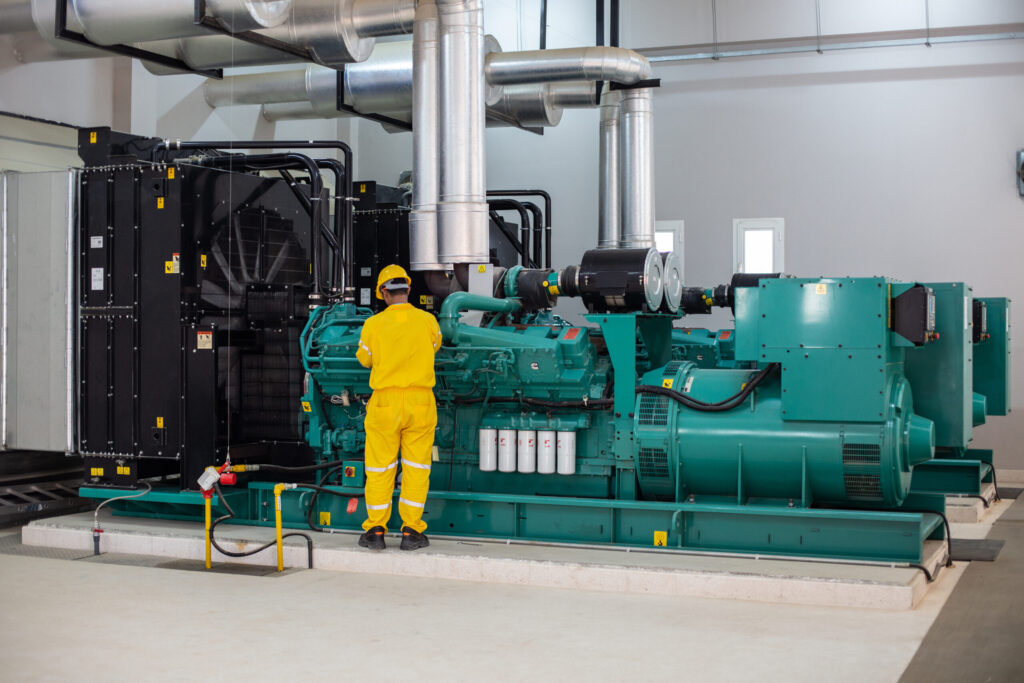
Factories and warehouses need strong power that does not stop. You might use water-cooled diesel generators because they can handle big jobs for a long time. People who work in factories say these generators last many years if you take care of them. Some common things they notice are:
- If the cooling system breaks, like a hose pops, the generator can stop.
- Wet stacking can hurt the engine if you do not use enough load.
- Dirty diesel fuel can make the generator break during long use.
Many factory managers trust water-cooled generators for important power. They follow strict care rules and use good fuel to keep things working well.
You have seen that a water cooled diesel generator gives strong cooling, steady power, and long life. Experts say these generators work best for heavy use or long outages. You will pay more and need to do more care, but you get better reliability. If you need power for big jobs, this generator is worth it. For light use, other diesel generators may fit better.
FAQ
How often should you service a water-cooled generator?
You should check your generator every six months or after 250 hours. Experts say you need to look at coolant, oil, and filters often. This helps your generator work well and last longer.
Can you use water-cooled diesel generators for home backup power?
You can use these generators to keep your house powered during blackouts. They work well when the power is out for a long time. Many people trust them for steady power at home. Studies show they do better than air-cooled models if you need power for many hours.
What is the main difference between water-cooled and air-cooled diesel generators?
Water-cooled generators use liquid to take away heat. Air-cooled models use fans to cool the engine. Water-cooled units last longer and are quieter. Experts say water-cooled systems are best for hard jobs. Air-cooled systems are good for smaller tasks.
Do water-cooled generators cost more to maintain?
It costs more to take care of a water-cooled generator. You need to check the coolant, hoses, and pumps often. The National Fire Protection Association says you should inspect your generator to stop problems and keep your power safe.
Are water-cooled diesel generators fuel efficient?
Water-cooled diesel generators use less fuel when working hard. This means you spend less money on fuel over time. Studies show water-cooled models save more fuel at high power.
